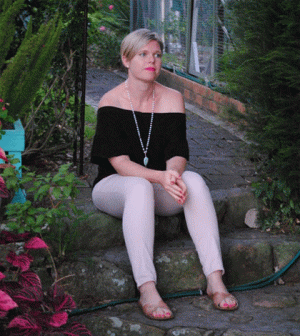- Finding Unshakable Power in a World That Wants to Pull Us ApartPosted 5 months ago
- What could a Donald Trump presidency mean for abortion rights?Posted 5 months ago
- Financial Empowerment: The Game-Changer for Women in Relationships and BeyondPosted 6 months ago
- Mental Health and Wellbeing Tips During and After PregnancyPosted 6 months ago
- Fall Renewal: Step outside your Comfort Zone & Experience Vibrant ChangePosted 6 months ago
- Women Entrepreneurs Need Support SystemsPosted 7 months ago
“Moving Away From Mental Disquiet: Humble Acts of Restorative Kindness”

By Amanda Racanovic
You can offer the world no love or kindness if you first cannot love and be kind to yourself.
After a very stressful week with family, I returned home with a throbbing head full of words, and a complete disconnect from my present world, my children, and life, and an utter incomprehension for why and how I managed to lose self-love and self-kindness after so short a time away.
Whether to my detriment or to my betterment, I am a highly sensitive empathic being, and being exposed to language that is negative, hurtful and apathetic is incredibly destructive, and will often force me to question myself entirely.
Perhaps a fear of inadequacy, of difference – I’m not sure – my presence had an effect on the person with whom we were staying, and in the course of a week, I experienced numerous skeptical, critical and undermining remarks pertaining to my diet, personal beliefs and values, which culminated in a highly unpleasant conversation where I was told that I needed to do what everyone else does, and think what everyone else thinks.
Kindness has an amazing effect. It enables us to relax the mind and the body, to breathe deep breaths, and it has a trickle-down effect that flows from one person to another. So when the need for one person to judge, criticize, critique, challenge, dismiss or condemn another happens, the mind and body tenses, the breath becomes short and shallow, and the adrenal glands work harder as our body goes into fight or flight mode. In my personal experience, the dialogue of others who were critical, undermining and disrespectful of my own voice became a dialogue in my own mind, and the consequence is self-destruction: the complete removal of self-love and kindness.
So how do you begin to move away from this negative self-sabotaging cycle of consciousness? How can you move out of it into a more relaxed, happy and balanced state of mind, free of critical, nasty thoughts perpetuated and oftentimes put there by others?
In his writing on mindfulness, Buddhist monk Thich Nhat Hahn often speaks of Compassionate Kindness as the answer to anger and hate. It is very much about empathy, deep listening (not speaking), self-awareness and self-control:
“practice mindfulness, calm, deep listening and loving speech …you should practice mindfulness – for the sake of your own calm, your own happiness, but also for that of other people as well,” (1997, pp. 92-93).
I would posit it is also about abstinence from self-indulgent complaining, and sinking into a deeper meditative state of silence. For instance, if you’re hurting, practicing compassionate kindness means refraining from expressing those problems audibly, as this will alter your consciousness into a deeper state of unhappiness. In instances of harmful and negative thought patterns, silence is a healing force, along with one other vital thing.
In True Love: A Practice for Awakening to Heart, Hanh uses the analogy of the mind as a scanning light – or ‘the light of mindfulness’ – and the body as land. Achieving, regaining and maintaining mindfulness and self-enlightenment is about the reconciliation between ruler (mind) and domain (body). To emphasize his point, Hanh litters his analogy with geographical terms.
“We must maintain surveillance of our territory in order to know what is going on there, who is there, what conflicts are there, what wars, what suffering. And it is only through a precise view of your territory that you can manage actually to do something and restore harmony and order there – among the forms, the sensations, the perceptions, the mental formations, and the consciousness-knowledge.” (1997, pp. 78-79).
In order for the depressed, disempowered, mentally clouded and confused person to heal negative thoughts and thus gain power once more of themselves, the body needs to be reclaimed. The body needs to be seen. The body needs to be felt and loved. This doesn’t just mean letting someone give you a massage (although this does help) or letting someone else pamper you. In order for negative thoughts to be removed, the body needs to reconnect with the earth.
As Hanh writes, the body is essentially land, and we must exercise the land for it to prosper, for it to yield. The delicate mind can find exercise enough in walking. The feel of the earth underfoot, the silence of nature, will heal and alter the troubled mind. Walking therefore becomes a meditation and a purging of the inessential, and over time, the reconciliation of mind and body will show.
In my own case, it was only after a long, vigorous walk that my breath deepened, that the voices subsided, and that I was able to once more regain ‘surveillance of my territory.’ It is not to be taken for granted, this body of ours. It is not to be taken for granted, this earth of ours. Let us forever honour and love them both.
********
 Amanda Racanovic lives in Melbourne, Australia, with her two daughters and husband. She works with women and mothers of young children and is passionate about self-care and women’s wellbeing in nurturing and raising children mindfully.
Amanda Racanovic lives in Melbourne, Australia, with her two daughters and husband. She works with women and mothers of young children and is passionate about self-care and women’s wellbeing in nurturing and raising children mindfully.






